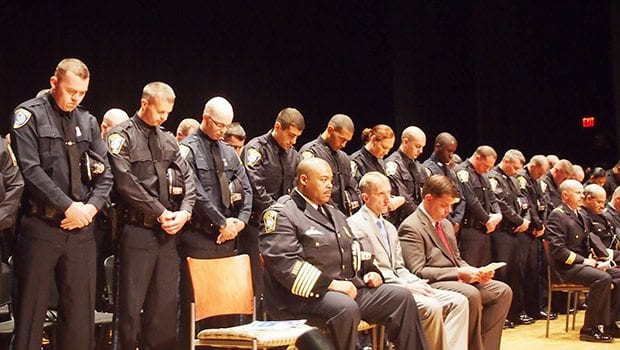
When the newest class of police officers was sworn in two weeks ago, the command staff on the stage — Superintendent Lisa Holmes, Superintendent-in Chief William Gross and Commissioner William Evans — showed the diversity of the police brass.
The recruits showed a different trend. Just 11 of the 63 new officers were people of color.
Holmes, who heads the police academy, told the Banner the class, which was recruited last year and began training in December, was made up almost entirely of military veterans who by state law are placed at the top of the list so long as they score at least 70 on the Civil Service exam.
The high concentration of mostly-white veterans undermined what Holmes said was an unprecedented effort to recruit a diverse pool of candidates last year, using billboards, posters, MBTA ads, newspaper and radio ads and outreach to community groups.
Applications were made available online and Holmes, working with then-Sgt. Detective Norma Ayala Leong, helped candidates fill out applications and offered waivers for the $100 application fee.
“Quite a few of the people I helped got waivers,” Holmes said.
Because the test is administered by the Civil Service Commission, Holmes does not have figures on how many of those the department reached out to actually took the exam.
Hiring of police and fire fighters in Massachusetts is administered by the Civil Service Commission and based on test scores from the commission’s exam. Cities and towns are allowed to place conditions on hiring. In Boston, police officers must live in the city for no less than one year before they are hired.
Holmes said the department undertook its efforts to help diversify the pool of recruits at a time when fewer people — white or black — are applying for work with the department.
“Law enforcement jobs are not as popular as the used to be,” Holmes said.
For decades, the department’s hiring practices were subject to a consent decree, stemming from a 1974 court ruling that found a pattern of discrimination against black and Latino job applicants. Under the consent decree, the department was required to consider one black or Latino applicant for every white applicant considered. For each applicant — black, Latino or white — not hired, the department was required to give a written explanation to attorneys for the NAACP.
The department was required to work under the consent decree until the percentage of black and Latino officers working for the department matched their percentages in the city’s population. In 2004, a judge ruled that the percentages of blacks and Latinos in the department matched their percentages in the city’s population and removed the consent decree.
While the numbers of black and Latino officers hired has been on the decline since 2004, Holmes says the department is committed to maintaining diversity in its ranks.
“People feel more comfortable with people who look like them, somebody they feel can relate to them,” she said. “We need a pool that reflects the communities we serve.”
Holmes, who became an officer in 1985, said police work can lead to a fulfilling career.
“Every day is different,” she said. “You really get to do a lot of good for people. You get to help people in ways you never thought possible. You effect change in people’s lives.”
In related news, the City Council last week held a hearing on an ordinance proposed by at large Councilor Michael Flaherty that would expand the residency requirement for police recruits from one year to three. Police Commissioner William Evans and then-acting Fire Commissioner John Hasson testified on behalf of the ordinance last week and seven councilors have signed on as co-sponsors.
The ordinance also received support from Larry Ellison, the president of the Massachusetts Association of Law Enforcement Officers, and Rayshawn Johnson, president of the Boston Society of Vulcans, an organization of black and Latino fire fighters.
“This ordinance maintains the intentions of the residency preference while providing opportunities to more local, long-time Bostonians who have either grown up in the city or are better acquainted with the neighborhoods we have,” Flaherty said in a statement sent to the Banner. “Additionally, there have been concerns over the years about the lack of diversity within public safety jobs and that issue will be addressed by this ordinance.”
District 7 Councilor Tito Jackson said Flaherty’s ordinance would help make the police department more responsive to the community’s needs.
“It’s critical that officers know the community, are culturally competent and understand the city of Boston,” Jackson said. “We need to fight to make sure police officers are a reflection of the diversity of the city of Boston.”







